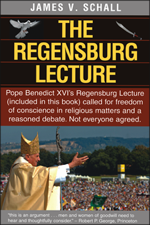On Sept. 12, 2006, Pope Benedict XVI gave an academic lecture in Regensburg, Germany that argued for both the reasonableness of faith and that faith divorced from reason can produce behaviors contrary to God's will. In this context, Benedict cited the opinion of a fourteenth-century Byzatine emperor that "not acting reasonably is contrary to God's nature." The emperor had illustrated his claim about unreasonable religious behavior by discussing the use of violence to coerce conversion, ascribing such practices in polemical terms to Islam, and this language was quoted by Pope Benedict.The lecture sparked international protests in many Islamic countries. The protestors had apparently concluded or were advised that Benedict himself believed Islam to be, in the quoted words from the fourteenth-century, "only evil and inhuman." Since the papal lecture did not include any examples of unreasonable Christian behavior or reiterate formal Catholic teaching from the Second Vatican Council that the Church regards Muslims with esteem, the likelihood of unintended negative interpretations of the speech was increased. On the other hand, some of the protests in the Muslim world themselves bordered on violence or used symbolic violence, thereby reinforcing the caricature of Islam as inherently violent that the Pope was being accused of purveying. On Octber 12, Islamica magazine published a response to the papal lecture from 38 Muslims scholars and leaders.
- Excerpts from the papal lecture, "Faith, Reason and the University: Memories and Reflections," Sept. 12, 2006
- Statement from the Director of the Vatican Press Office, Sept. 15, 2006
- Statement from the Holy See's Secretary of State, Cardinal Tarcisio Bertone, Sept. 16, 2006
- Pope Benedict's statement during Sunday prayers, Sept. 17, 2006
- Pope Benedict's general audience remarks, Sept. 20, 2006
- Pope Benedict's Meeting with Muslim Envoys, Sept. 25, 2006
 Those accustomed to reading about the address only in the context of the ensuing "Regensburg Rage" -- a rash of violent Muslim protests, culminating in the murder of a nun in Somalia and the kidnapping and beheading of an Assyrian priest in Iraq -- will be suprised to discover that only a small portion of it actually touched on Islamic-Christian relations (approximately 3 paragraphs).
Those accustomed to reading about the address only in the context of the ensuing "Regensburg Rage" -- a rash of violent Muslim protests, culminating in the murder of a nun in Somalia and the kidnapping and beheading of an Assyrian priest in Iraq -- will be suprised to discover that only a small portion of it actually touched on Islamic-Christian relations (approximately 3 paragraphs).
Rather, Pope Benedict's focus was not so much on Islam but rather an even greater indictment of the program of dehellenization that played out in Western academia following the Reformation and the liberal theology of the nineteenth and twentieth centuries and which led to the "modern self-limitation of reason," -- confining itself to that which is scientifically (mathematically and emperically) verifiable, and dismissing as irrelevant "the specifically human questions about our origin and destiny, the questions raised by religion and ethics."
For helpful analysis of the more substantial portion of Benedict's address, see:
- The Regensburg Lecture: Thinking Rightly About God and Man by Fr. James V. Schall, S.J. (Ignatius Insight September 15, 2006).
- Benedict, Islam, Faith, and Reason by Ryan T. Anderson. First Things September 20, 2006.










No comments:
Post a Comment